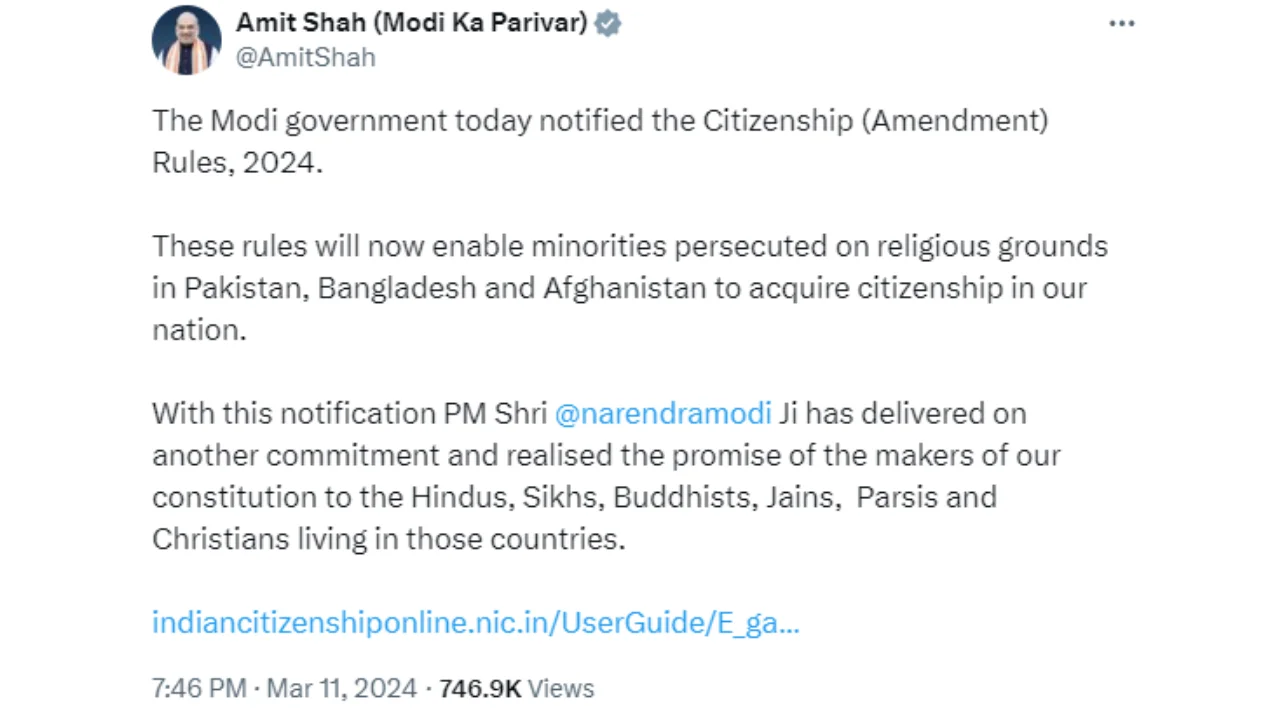Citizenship Amendment Act, 2024
On Monday (11/3/24), the Union Home Ministry officially released the long-awaited rules for the Citizenship Amendment Act (CAA), 2019. These rules, now known as the Citizenship (Amendment) Rules, 2024, signify a significant stride forward in streamlining the application process for Indian citizenship, particularly for those eligible under the CAA-2019. This development holds paramount importance in providing refuge to persecuted individuals and aligns with the BJP’s 2019 manifesto.
What is Citizenship Amendment Act (CAA)?
Enacted by the Modi government in 2019, the Citizenship Amendment Act (CAA) is a legislative framework that seeks to grant Indian citizenship to persecuted non-Muslim migrants. The beneficiaries include Hindus, Sikhs, Jains, Buddhists, Parsis, and Christians who fled from Bangladesh, Pakistan, and Afghanistan and arrived in India before December 31, 2014.
Framework for Application Process

With the introduction of the Citizenship (Amendment) Rules, 2024, there is now a structured framework for the application process under CAA-2019. This development is pivotal in realizing the primary objective of providing a legal pathway for persecuted individuals to obtain Indian citizenship.
Exclusions and Safeguards
While providing a pathway to citizenship, the CAA has defined exclusions. It does not apply to regions under the Sixth Schedule of the Constitution and areas like Assam, Meghalaya, Mizoram, and Tripura, covered by the Inner Line Permit system. This deliberate exclusion aims to safeguard the interests of tribal and indigenous communities in the North-Eastern region, ensuring that the legislation does not impact these unique demographic groups.
Citizenship Grant Statistics
Over the past six years, India has granted citizenship to approximately 2,830 citizens from Pakistan, 912 from Afghanistan, and 172 from Bangladesh. It is noteworthy that a significant portion of these individuals belongs to the majority communities in their respective countries, reinforcing the humanitarian aspect of the CAA.
Non-discriminatory Intent of CAA
Contrary to some criticisms, the Citizenship Amendment Act (CAA) does not target any specific religious community from abroad. Instead, it establishes a legal framework for migrants who might have been considered “illegal” otherwise. The legislation provides them with the opportunity to apply for Indian citizenship, contingent on meeting specific conditions related to religious persecution.
Opposition and Criticisms
Despite its intended humanitarian objectives, the CAA has faced widespread opposition and protests across the nation. Various political parties, including the Congress party, have criticized the law, labeling it as “discriminatory.” Additionally, concerns have been raised about the timing of the rule notification, with allegations that it may be strategically linked to influencing the upcoming Lok Sabha elections in West Bengal and Assam.
Conclusion: Citizenship Amendment Act
The unveiling of the Citizenship (Amendment) Rules, 2024, represents a significant milestone in the implementation of the Citizenship Amendment Act (CAA). As the application process for Indian citizenship under CAA-2019 commences, the impact and implications of this legislation continue to be subjects of ongoing debate and scrutiny. It remains to be seen how these rules will shape the future of individuals seeking refuge in India and contribute to the broader discourse on citizenship and religious persecution.
- RRB ALP Vs RRB JE, Which is Better Job?
- Central Bank of India Apprentice Exam Date 2025 Out
- SSC CHSL English Syllabus 2025, Check Detailed Syllabus
- SSC GD Constable Exam News & Next Notification Update
- SBI PO Handwritten Declaration 2025, Format, Image Size

